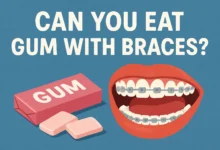Swollen Gums with Braces: What’s Normal, What’s Not, and When to Worry
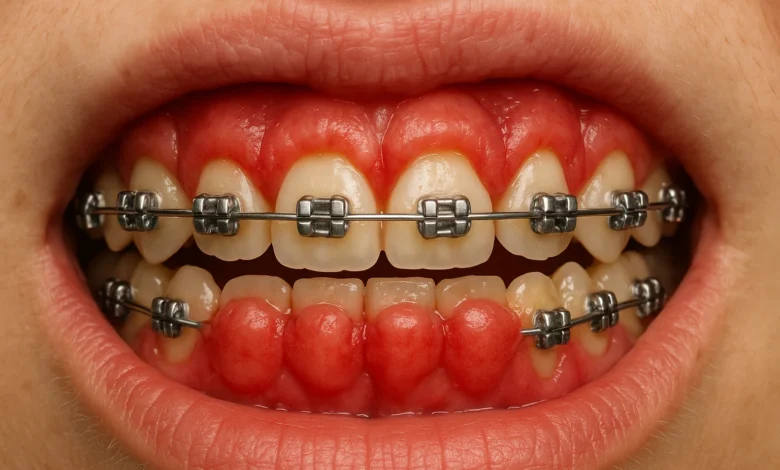
Swollen Gums with Braces: Causes, Remedies, and Prevention
Gum swelling with braces is frequently encountered in orthodontic patients. Braces are effective at straightening teeth and correcting bite problems, but they also have the potential to lead to gum discomfort, inflammation, and pain. If you are in braces and your gums are swollen, you’re not the only one. In this comprehensive guide, you’ll discover absolutely everything you need to know about swollen gums with braces, including what causes the are swollen gums, its symptoms, tried-and-true treatments and so much more.
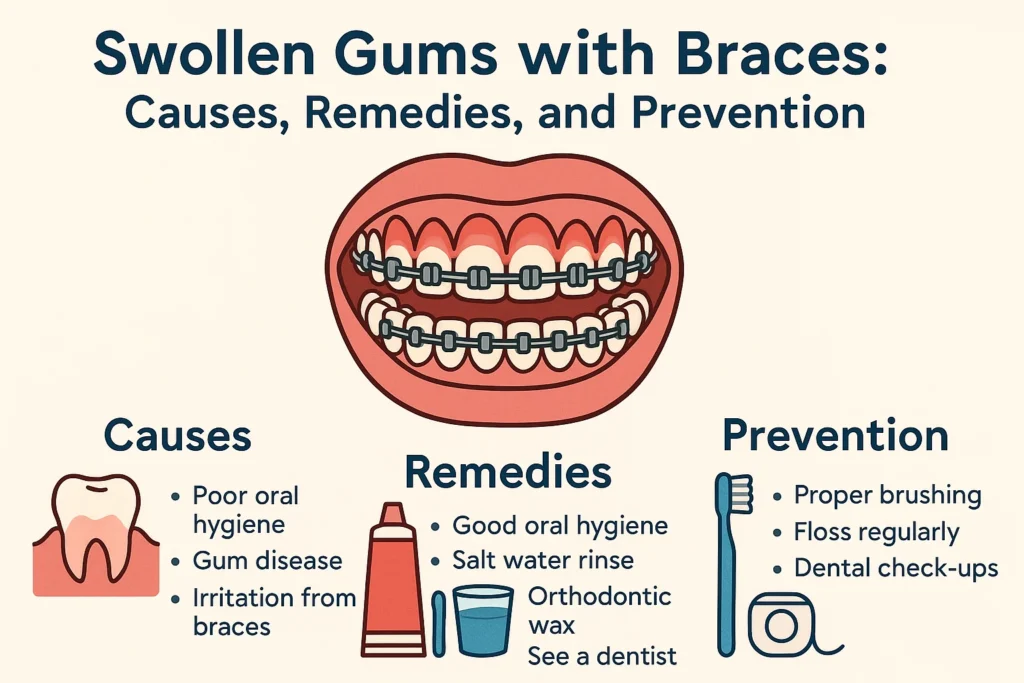
1. Introduction
Braces are an orthodontic miracle. Misaligned teeth are gently moved into the proper position to address overbites and malocclusion and provide for a healthier more beautiful smile. However, swollen gums is something many patients with braces deal with. This inflammation is mild-severe at times, but it is uncomfortable, particularly now, because treatment has just begun or the braces just got adjusted.
Knowing the reasons behind the swelling of your gums with braces and how to cope with it or prevent it are an important part of ensuring dental health through the course of your orthodontic treatment.
2. What Causes Swollen Gums with Braces?
There are several reasons why you might experience swollen gums with braces. Let’s explore the most common causes:
a. Poor Oral Hygiene
Brackets and wires can trap food and plaque. If you are not brushing or flossing properly, plaque and tartar will develop and make the gums red and inflamed.
b. Gingivitis
Gingivitis is the first stage of gum disease, and it is characterized by red, inflamed, puffy gums. This is a very common issue for those who wear braces, and is a result of the struggle to keep proper oral hygiene.
c. Braces-Induced Irritation
Brackets and wires may rub against your gums, particularly in the early stages, and lead to localized inflammation. This form of “mechanical disturbance” may itself be the cause of the swelling.
d. Hormonal Changes
Pubescent patients with braces who undergo orthodontic treatment can experience an increase in inflammation of the gums.
e. Allergic Reactions
In certain cases, patients could also have allergic responses to metals in the braces and their gums may look lumpy and swollen.
3. Symptoms to Watch For
Identifying swollen gums with braces early can prevent further complications. Here are symptoms you should monitor:
Puffy or enlarged gums
Red or purple discoloration
Tenderness or pain in the gum area
Bleeding while brushing or flossing
Bad breath (halitosis)
Difficulty eating or chewing
If any of these symptoms persist, consult your orthodontist or dentist.
4. Is Gum Swelling Normal During Braces Treatment?
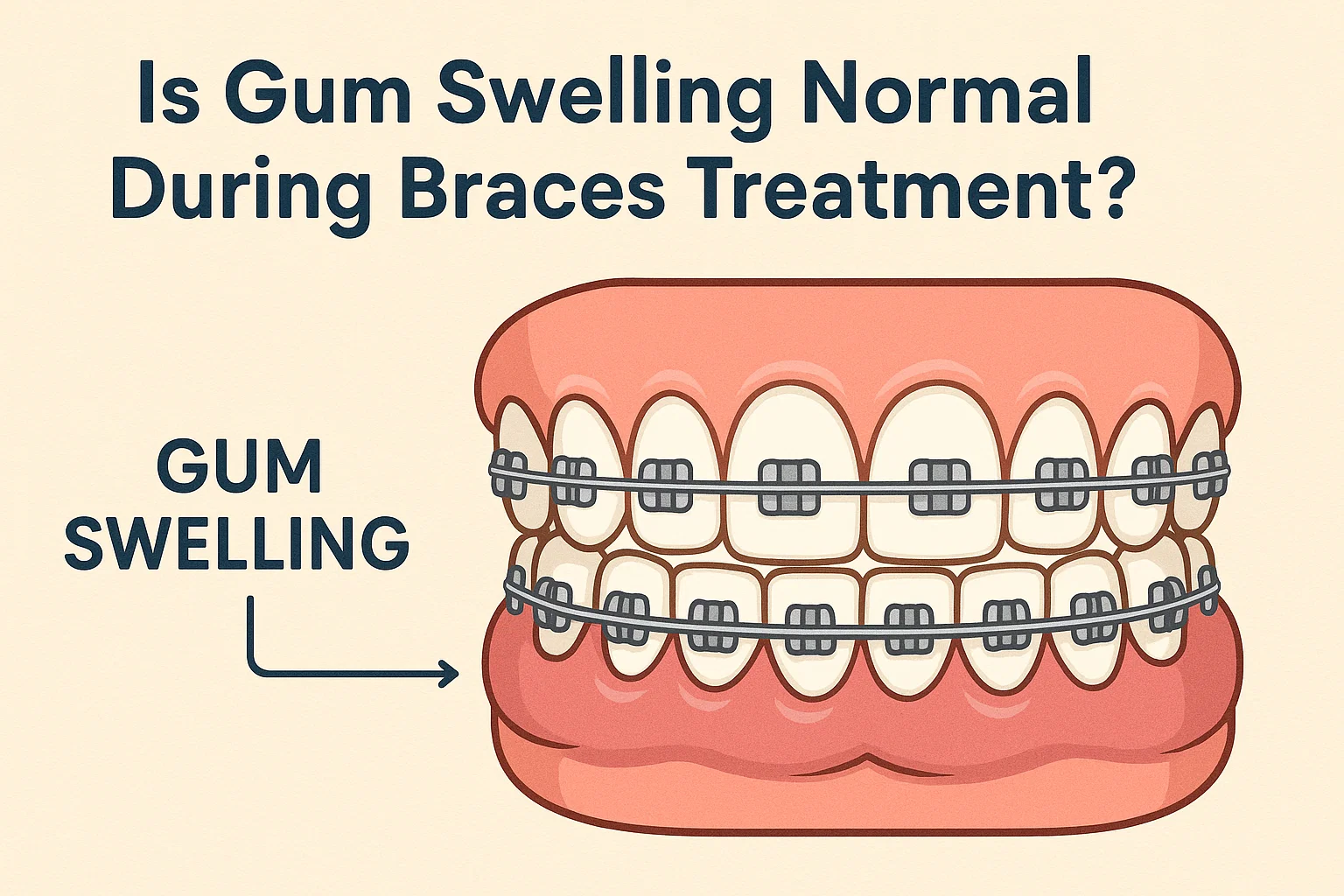
It is true that some gum swelling is normal and common, especially in the first week or two of wearing braces, and the day or two following a wire tightening. This is your body’s way of responding to the different pressures and your new oral environment. Nonetheless, consistent swollen gums with braces is not normal and may be a signal of a more severe issue such as gingivitis or periodontal disease.
5. Common Risk Factors for Gum Swelling with Braces
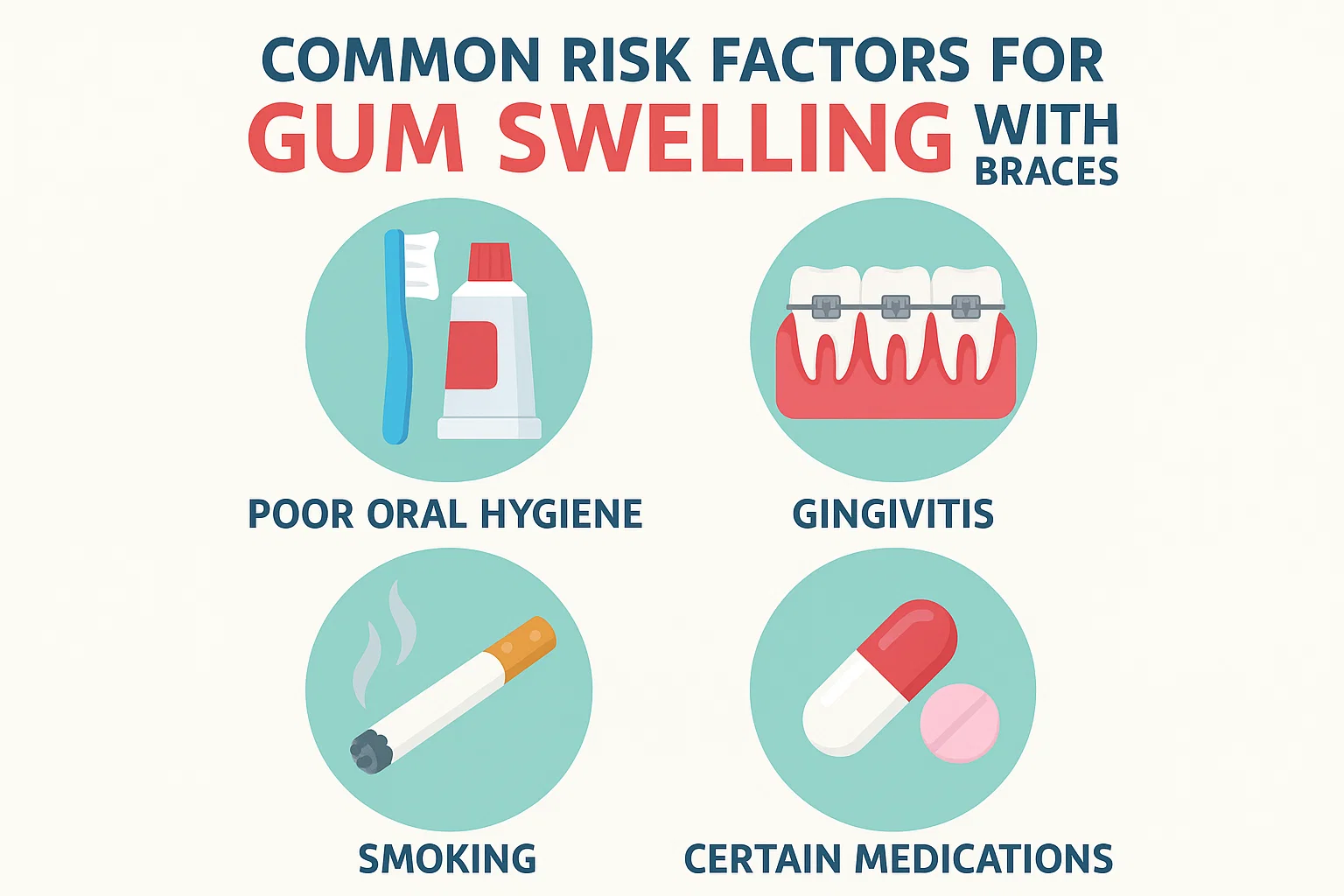
Several factors may increase your risk of experiencing swollen gums with braces:
Smoking or using tobacco
High sugar diet
Inconsistent oral hygiene
Existing gum disease before braces
Genetic predisposition to gum problems
Wearing braces for an extended period
Recognizing these risk factors can help you proactively manage your gum health.
6. Can Braces Cause Gum Disease?
So to answer directly: braces do not cause gum disease. But, they can set up conditions that can lead to the development of gum disease if you’re not vigilant in your care. Gums swollen with braces typically are an early sign of gingivitis or periodontitis caused by inadequate plaque removal.
To avoid this, maintaining a vigilant teeth brushing and flossing care schedule, especially around brackets and under wires, is especially important.
7. How to Treat Swollen Gums with Braces
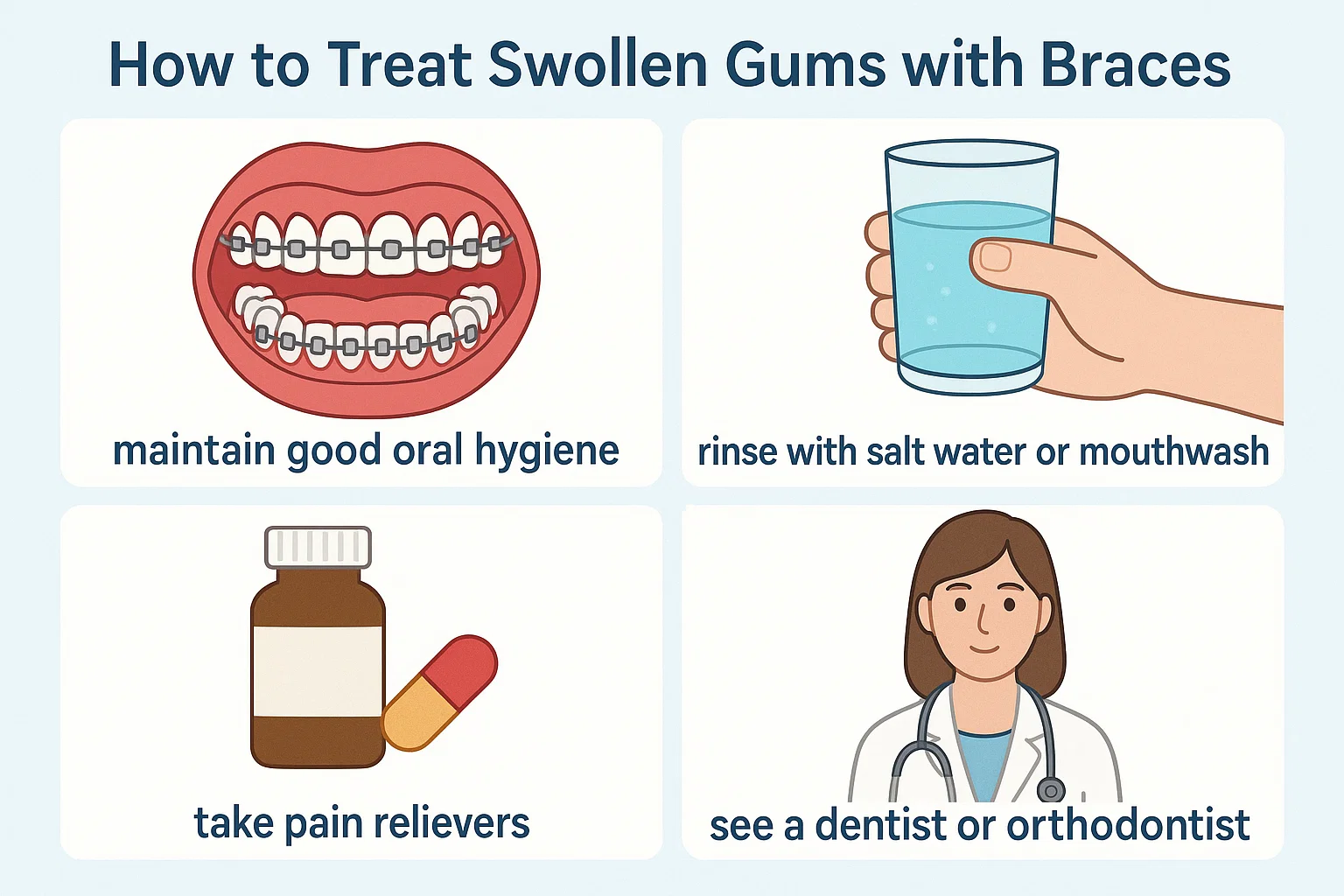
Managing swollen gums involves a mix of improved hygiene, orthodontic adjustments, and sometimes medication. Here are effective treatment options:
a. Improve Oral Hygiene
Using an orthodontic brushing or electric toothbrush which is appropriate for braces. Brush twice daily with clean teeth, and use a floss threader or water flosser.
b. Antibacterial Mouthwash
If so, they may advise you to rinse with a mouthwash with chlorhexidine or cetylpyridinium chloride to decrease bacteria and inflammation.
c. Salt Water Rinses
Twice daily gargling with warm salt water (one teaspoon of salt in a cup of warm water) reduces inflamed gums.
d. Orthodontic Wax
Apply orthodontic wax to brackets or wires that irritate your gums.
e. Medication
Over-the-counter pain relievers like ibuprofen can reduce gum pain and inflammation. For more severe cases, your orthodontist may prescribe antibiotics or steroidal mouth rinses.
8. Natural Remedies for Swollen Gums
If you prefer natural options, several remedies may help reduce swollen gums with braces:
Aloe vera gel: Apply directly to gums for its soothing effect.
Green tea: Contains anti-inflammatory compounds that promote gum health.
Clove oil: Acts as a natural antiseptic; dab a small amount on affected gums.
Turmeric paste: Mix turmeric with water and apply gently to inflamed areas.
These remedies are not a replacement for professional treatment but can complement it.
9. Best Oral Hygiene Practices with Braces
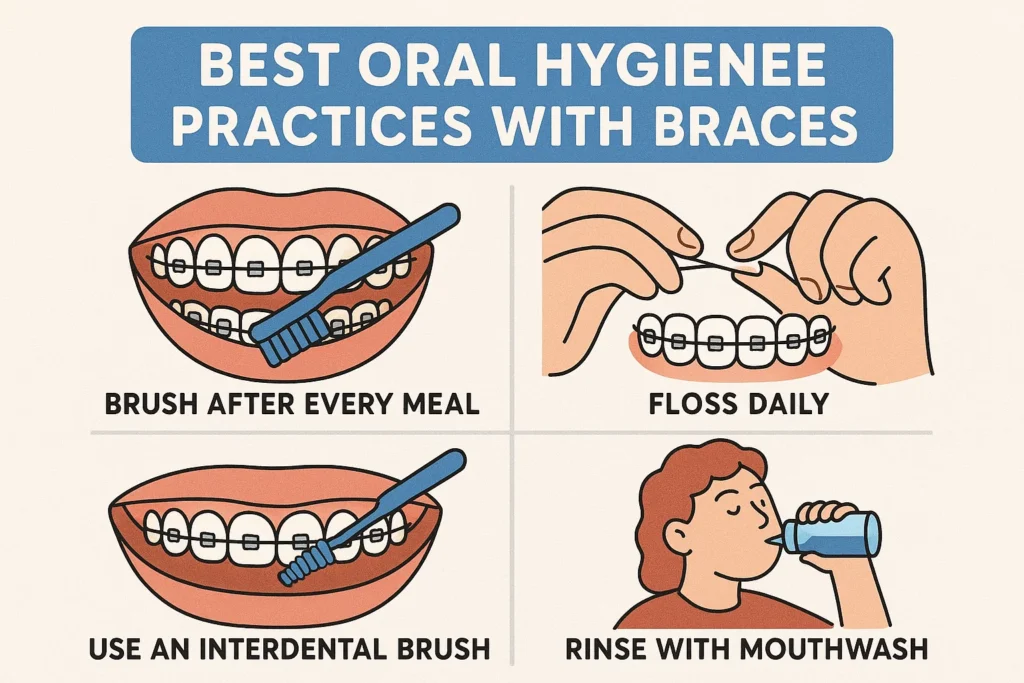
Preventing swollen gums with braces starts with excellent oral hygiene. Follow these best practices:
Brush after every meal
Use fluoride toothpaste
Clean around each bracket and under wires
Floss daily with orthodontic flossers or water flossers
Rinse with mouthwash regularly
Schedule professional cleanings every 3-6 months
Maintaining a strict routine is key to keeping your gums healthy during orthodontic treatment.
10. Foods to Eat and Avoid
Your diet can significantly impact gum health. Here’s what to eat and what to avoid when managing swollen gums with braces.
Best Foods:
Soft fruits (bananas, berries)
Cooked vegetables
Whole grains
Yogurt and milk
Lean proteins
Foods to Avoid:
Sugary snacks and soda
Sticky candies
Hard nuts or popcorn
Crunchy chips
Acidic fruits (pineapple, lemon)
A braces-friendly diet not only protects your braces but also supports healthy gums.
11. When to See a Dentist or Orthodontist
Seek professional help if:
Swollen gums persist for more than a week
There is pus or discharge from gums
You experience loose teeth
Pain becomes unmanageable
Gums bleed profusely when brushing
These signs may indicate severe gingivitis or early-stage periodontitis, which requires immediate intervention.
12. Preventing Swollen Gums with Braces
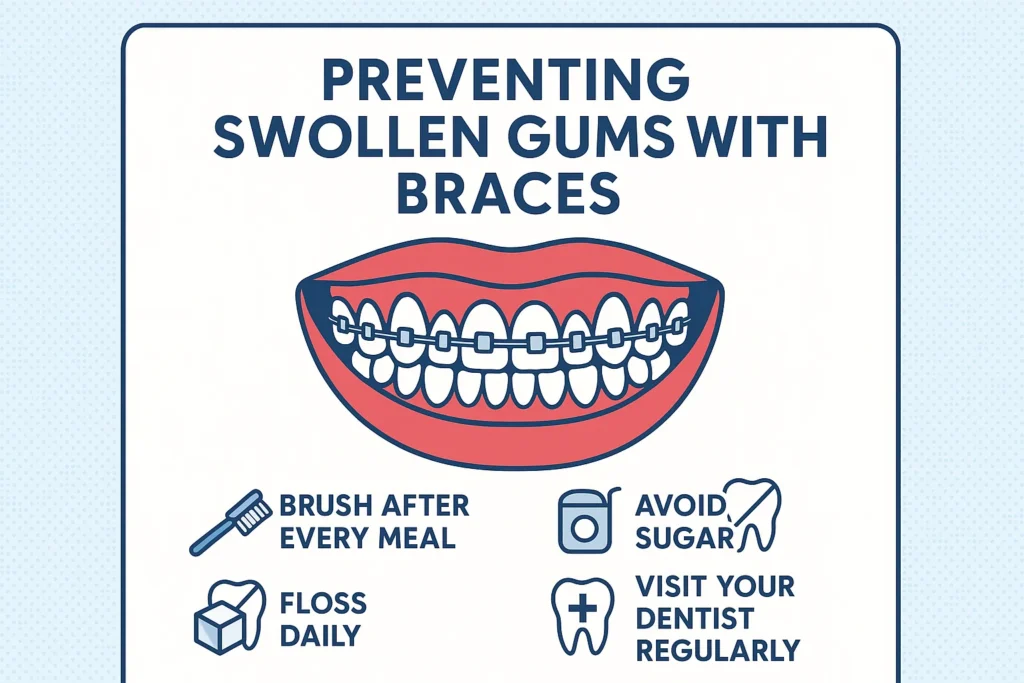
Preventive care is your best defense. Here’s how you can avoid swollen gums during your orthodontic journey:
Schedule regular checkups with your orthodontist and dentist
Use fluoride treatments if recommended
Keep a braces care kit (toothbrush, floss, wax) with you
Avoid snacking frequently between meals
Stay hydrated to keep your mouth clean and moist
Early prevention ensures that gum swelling doesn’t derail your orthodontic progress.
13. Swollen Gums After Braces Removal
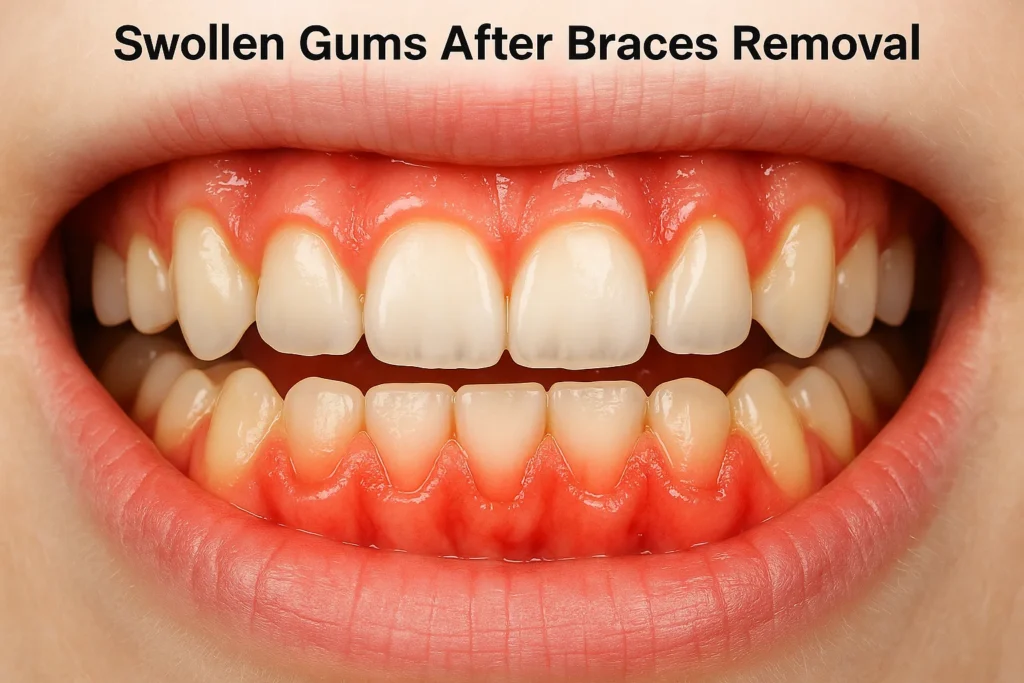
It is possible to have swollen gums with braces after they come off. This is usually transient and due to tissue realignment. Keep up the good work with oral hygiene, and try a professional cleaning to clear away any residual plaque.
Consult your dentist if the swelling remains for more than two weeks to determine if potential gum issues may be lingering.
14. Frequently Asked Questions (FAQs)
Q1: Are swollen gums with braces dangerous?
Not in and of itself, but it may lead to gum disease if untreated. Early management is key.
Q2: How long does gum swelling last with braces?
Minor swelling may persist for three days after a fine-tuning. Chronic inflammation may be caused by hygiene problems or friction.
Q3: Can swollen gums affect my braces treatment?
Yes. Gingivitis may limit the movement of the teeth and may prolong treatment.
Q4: Should I stop wearing braces if my gums are swollen?
Not exactly but see your orthodontist to help with the swelling and adjust your treatment if necessary.
Q5: Can I use mouthwash every day with braces?
Yes. To prevent irritation, use an alcohol-free, orthodontic-approved mouthwash.
15. Final Thoughts
Swollen gums with braces is an annoying problem; but it’s not exactly out of the ordinary as long as you know what to do. By knowing the causes and avoid situations that contribute, you can keep your gums healthy during your orthodontic treatment. Keep in mind, that your team of orthodontist and dentist is your best weapon against keeping your mouth in top form throughout this crucial time.
Maintain your daily hygiene, be regular with your appointments and don’t be afraid to ask for help if something feels off. A beautiful smile can bring so much into your life!
Bite Blocks Braces: The Secret to Faster and More Accurate Orthodontic Results
